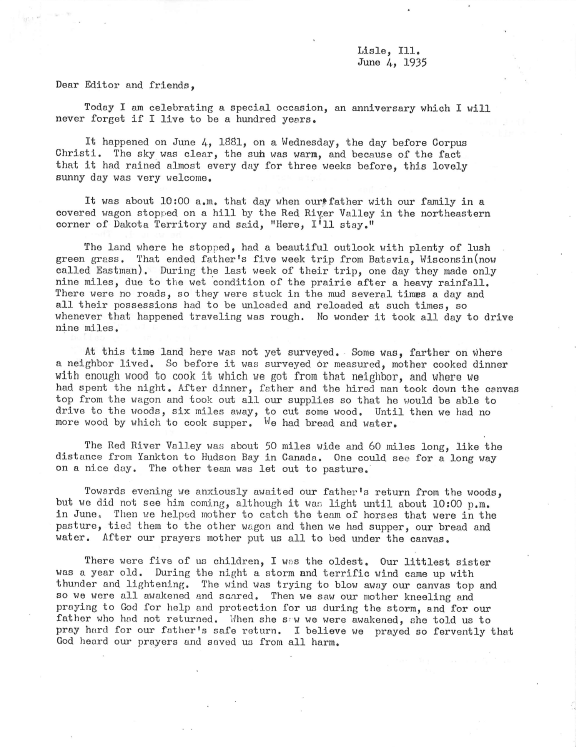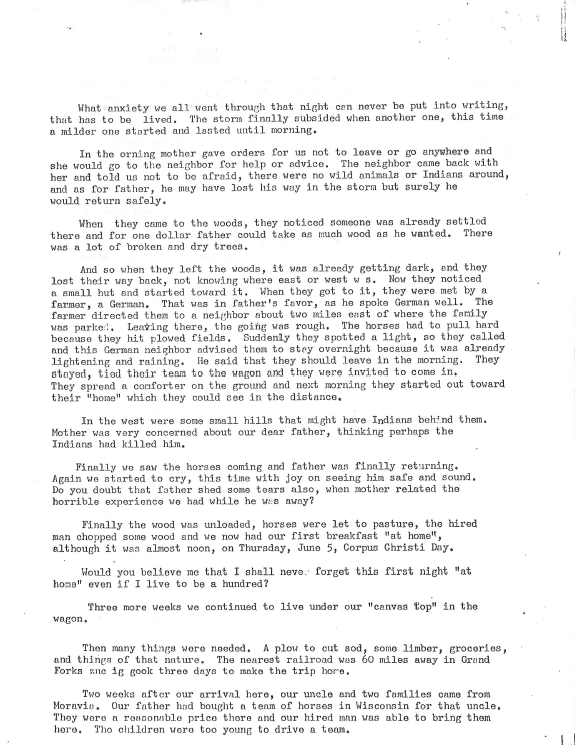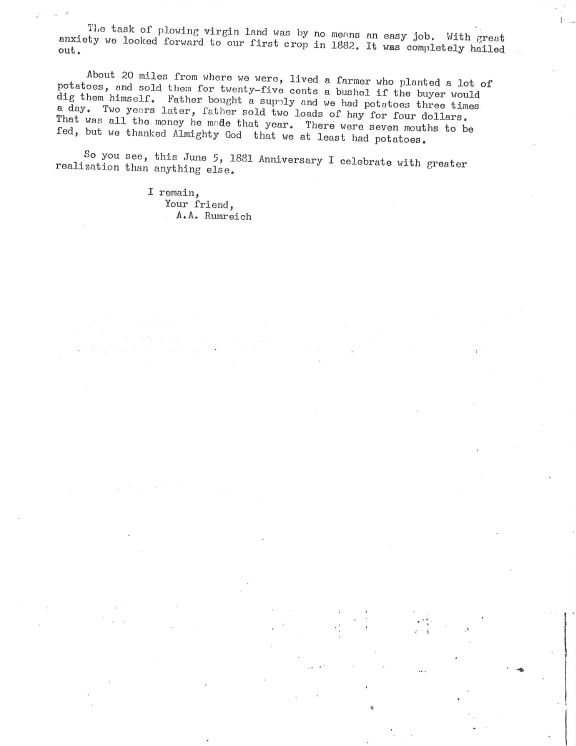
|
Today I am celebrating a special occasion, an anniversary which I will never forget if I live to be a hundred years. It happened on June 4, 1881, on a Wednesday, the day before Corpus Christi. The sky was clear, the sun was warm, and because of the fact that it had rained almost every day for three weeks before, this lovely sunny day was very welcome. It was about 10:00 a.m. that day when our father with our family in a covered wagon stopped on a hill by the Red River Valley in the northeastern corner of Dakota Territory and said, "Here, I'll stay." The land where he stopped had a beautiful outlook with plenty of lush green grass. That ended father's five week trip from Batavia, Wisconsin (now called Eastman). During the last week of their trip, one day they made only nine miles, due to the wet condition of the prairie after a heavy rainfall. There were no roads, so they were stuck in the mud several times a day and all their possessions had to be unloaded and reloaded at such times, so whenever that happened, traveling was rough. No wonder it took all day to drive nine miles. At this time land here was not yet surveyed. Some was, farther on where a neighbor lived. So before it was surveyed or measured, mother cooked dinner with enough wood to cook it which we got from that neighbor, and where we had spent the night. After dinner, father and the hired man took down the canvas top from the wagon and took out all our supplies so that he would be able to drive to the woods, six miles away, to cut some wood. Until then we had no more wood by which to cook supper. We had bread and water. The red River Valley was about 50 miles wide and 60 miles long, like the distance from Yankton to Hudson Bay in Canada. One could see for a long way on a nice day. The other team was let out to pasture. Towards evening we anxiously awaited our father's return from the woods, but we did not see him coming, although it was light until about 10:00 p.m. in June. Then we helped mother to catch the team of horses that were in the pasture, tied them to the other wagon and then we had supper, our bread and water. After our prayers mother put us all to bed under the canvas. There were five of us children, I was the oldest. Our littlest sister was a year old. During the night a storm and terrific wind came up with thunder and lightning. The wind was trying to blow away our canvas top and so we were all awakened and scared. Then we saw our mother kneeling and praying to God for help and protection for us during the storm, and for our father who had not returned. When she saw we were awakened, she told us to pray hard for our father's safe return. I believe we prayed so fervently that God heard our prayers and saved us from all harm. What anxiety we all went through that night can never be put into writing, that has to be lived. The storm finally subsided when another one, this time a milder one started and lasted until morning. In the morning mother gave orders for us not to leave or go anywhere and she would go to the neighbor for help or advice. The neighbor came back with her and told us not to be afraid, there were no wild animals or Indians around, and as for father, he may have lost his way in the storm but surely he would return safely. When they came to the woods, they noticed someone was already settled there and for one dollar father could take as much wood as he wanted. There was a lot of broken and dry trees. And so when they left the woods, it was already getting dark, and they lost their way back, not knowing where east or west was. Now they noticed a small hut and started toward it. When they got to it, they were met by a farmer, a German. That was in father's favor, as he spoke German well. The farmer directed them to a neighbor about two miles east of where the family was parked. Leaving there, the going was rough. The horses had to pull hard because they hit plowed fields. Suddenly, they spotted a light, so they called and this German neighbor advised them to stay overnight because it was already lightning and raining. He said that they should leave in the morning. They stayed, tied their team to the wagon and they were invited to come in. They spread a comforter on the ground and next morning they started out toward their "home" which they could see in the distance. In the west were some hills that might have Indians behind them. Mother was very concerned about our dear father, thinking perhaps the Indians had killed him. Finally we saw the horses coming and father was finally returning. Again we started to cry, this time with joy on seeing him safe and sound. Do you doubt that father shed some tears also, when mother related the horrible experience we had while he was away? Finally the wood was unloaded, horses were let to pasture, the hired man chopped some wood and we now had our first breakfast "at home", although it was almost noon, on Thursday, June 5, Corpus Christi Day. Would you believe me that I shall never forget this first night "at home" even if I live to be a hundred? Three more weeks we continued to live under our "canvas top" in the wagon. Then many things were needed. A plow to cut sod, some lumber, groceries, and things of that nature. The nearest railroad was 60 miles away in Grand Forks and it took three days to make the trip home. Two weeks after our arrival here, our uncle and two families came from Moravia. Our father had bought a team of horses in Wisconsin for that uncle. They were a reasonable price there and our hired man was able to bring them here. The children were too young to drive a team. The task of plowing virgin land was by no means an easy job. With great anxiety we looked forward to our first crop in 1882. It was completely hailed out. About 20 miles from where we were, lived a farmer who planted a lot of potatoes, and sold them for twenty-five cents a bushel if the buyer would dig them himself. Father bought a supply and we had potatoes three times a day. Two years later, father sold two loads of hay for four dollars. That was all the money he made that year. There were seven mouths to be fed, but we thanked Almighty God that we at least had potatoes. So you see, this June 5, 1881 Anniversary I celebrate with greater realization than anything else.
Your friend, A.A. Rumreich |

